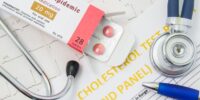Chronic sinusitis and mold allergy

Many of my patients come in with allergy problems that have been either not noticed, not treated, wrongly treated, or all of the above. We have already talked about dairy allergy and its role as a major cause of childhood ear infections and constipation. Now, it’s about mold allergy and growth of mold in the sinuses as a cause of “chronic sinusitis.” This can’t be treated by antibiotics. They do not kill molds. As a matter of fact antibiotics can often make the molds or other fungi grow.
I was inspired to write this blog by two patients who came in today. They had been sick with sinusitis and asthma–one since November, and one before that. They had been given several courses of antibiotics, and one had been put on steroids. They were still not getting well. We tested them, and both were reactive to mold.
Since they became ill, they had been treated by their internists as if they had bacterial infections, or common “allergies and asthma”. Fungal infection was never considered. I had seen a study several years ago documenting the connection between fungal infection and allergic reaction with chronic sinusitis. I checked to find the study because one of the patients asked me to do it, so that she could give it to her internist. I found a Mayo Clinic study.
According to the study, reactivity to molds should be investigated in every person with chronic sinusitis. I want to emphasize that what I said about the dairy/ear infection and dairy/constipation connections applies to sinusitis and molds as well: Every person should be aware of this. Every doctor should know this. Here is a report of the study:
Chronic Sinusitis Linked to Fungal Infection
Scientists supported by the National Institute of Allergy and Infectious Diseases (NIAID), part of the National Institutes of Health, have discovered that people with chronic sinus inflammation have an exaggerated immune response to common airborne fungi. The results of their study appear in “The Journal of Allergy and Clinical Immunology.”
“This study is the first to show a possible immunologic basis for chronic sinusitis, an important starting point to better understand the cause of the illness,” says Marshall Plaut, M.D., chief of NIAID’s allergic mechanisms section. Despite the enormous health impact of chronic sinusitis — nearly 30 million people were diagnosed with sinusitis in 2002, according to U.S. Centers for Disease Control and Prevention, and direct costs of the illness exceed $5.6 billion per year — the condition is very poorly understood, he says.
The researchers, led by Hirohito Kita, M.D., of the Mayo Clinic in Rochester, MN, compared blood samples taken from 18 people diagnosed with chronic sinusitis with blood samples from 15 healthy volunteers. Nasal secretions from the two groups were also examined for the presence of fungal proteins and inflammation- causing immune system molecules.
Airborne microscopic fungi spores abound indoors and out. People may inhale a million or more fungal spores each day, notes Dr. Kita. The mere presence of such fungi in the airways, however, is not enough to cause sinusitis because these spores can be found in the upper respiratory tracts of both sinusitis sufferers and non-sufferers. Indeed, in this study, levels of fungal proteins in nasal secretions were similar in both groups.
The Mayo Clinic scientists looked for evidence that people with sinusitis respond abnormally to these harmless fungi. The investigators exposed immune cells derived from the blood samples to extracts of four common airborne fungi: “Alternaria,” “Aspergillus,” “Penicillium” and “Cladosporium.” The cells of chronic sinusitis sufferers released significant amounts of three immune-modulating chemicals, called cytokines, specifically interferon-gamma, interleukin-5 (IL-5) and IL-13. In contrast, cells from healthy volunteers released very little interferon-gamma and no IL-5 or IL-13. The most dramatic responses occurred after exposure to “Alternaria.”
Importantly, says Dr. Kita, the released cytokines represent both major classes of cytokines — interferon-gamma is in the Th1 group and IL-5 and IL-13 are in the Th2 class. This is notable because scientists have thought that allergic reactions involve only Th2 cytokines, Dr. Kita explains. (While chronic sinusitis is not considered to be an allergic disease, people with the condition also often have asthma and allergic rhinitis, giving scientists reason to suspect a link.) The current findings add to an evolving understanding of allergic diseases that suggests symptoms may stem from a combination of Th1 and Th2 cytokines. [Inflammatory agents in the body.]
The combined effect of excess Th2 and Th1 cytokines released in the presence of fungi may explain a number of chronic sinusitis symptoms, including persistent inflammation of sinus and nasal mucous passages, say the scientists.
Previously, Mayo clinic scientists used intranasal antifungal agents to successfully treat patients with chronic sinusitis. While those studies generated controversy, in part because other researchers were unable to replicate the findings, Dr. Kita says today’s report supports the rationale of treating chronic sinusitis with antifungals. Clinical trials to further test antifungal therapy for chronic sinusitis are being planned, adds Dr. Kita.
Reference: S-H Shin et al. Chronic rhinosinusitis: An enhanced immune response to ubiquitous airborne fungi. “The Journal of Allergy and Clinical Immunology.” Published online Oct. 8, 2004. doi: 10.1016/j.jaci.2004.06.012. Source: NIAID, http://www.niaid.nih.gov
Other researchers have shown that in addition to treating chronic sinusitis with antifungals, often a visit to an Ear Nose and Throat (ENT) specialist is needed to clear existing mold growth out of the sinuses.
So if you have sinusitis that just won’t go away:
- See an ENT specialist and get a culture to find out whether you have mold in your sinuses, and whether you need to have the debris cleaned out.
- Get tested to find out whether you are allergic to molds.
- Get treated with antifungal drugs if necessary
- Make sure you are not being overexposed to molds in your home or workplace
By. Dr Martha Howard







